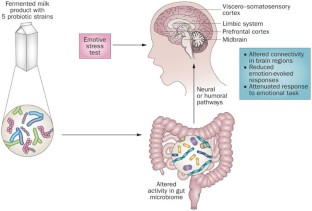Emerging evidence indicates that the intestinal microbiota influence brain chemistry, development and behaviour in animals. Tillisch and colleagues now show that ingestion of selected probiotics changes brain connectivity and responses to emotional challenge in healthy humans, paving the way for therapeutic exploitation of the microbiome–brain axis for functional gastrointestinal and primary behavioural disorders.
This is a preview of subscription content, access via your institution
Relevant articles
Open Access articles citing this article.
-
Probiotics maintain the gut microbiome homeostasis during Indian Antarctic expedition by ship
Scientific Reports Open Access 22 September 2021
-
Effects of NB001 and gabapentin on irritable bowel syndrome-induced behavioral anxiety and spontaneous pain
Molecular Brain Open Access 16 June 2014
-
Fermented foods, microbiota, and mental health: ancient practice meets nutritional psychiatry
Journal of Physiological Anthropology Open Access 15 January 2014
Access options
Subscribe to this journal
Receive 12 print issues and online access
$209.00 per year
only $17.42 per issue
Buy this article
- Purchase on Springer Link
- Instant access to full article PDF
Prices may be subject to local taxes which are calculated during checkout

References
Tillisch, K. et al. Consumption of fermented milk product with probiotic modulates brain activity. Gastroenterology http://dx.doi.org/10.1053/j.gastro.2013.02.043.
Bercik, P. et al. The intestinal microbiota affect central levels of brain-derived neurotropic factor and behavior in mice. Gastroenterology 141, 599–609 (2011).
Collins, S.M., Surette, M. & Bercik, P. The interplay between the intestinal microbiota and the brain. Nat. Rev. Microbiol. 10, 735–742 (2012).
Cryan, J.F. & Dinan, T. G. Mind-altering microorganisms: the impact of the gut microbiota on brain and behaviour. Nat. Rev. Neurosci. 13, 701–712 (2012).
McNulty, N.P. et al. The impact of a consortium of fermented milk strains on the gut microbiome of gnotobiotic mice and monozygotic twins. Sci. Transl. Med. 3, 106ra106 (2011).
Van Oudenhove, L. et al. Fatty acid-induced gut-brain signaling attenuates neural and behavioral effects of sad emotion in humans. J. Clin. Invest. 121, 3094–3099 (2011).
Schreiber, J. et al. Neurologic considerations in propionic acidemia. Mol. Genet. Metab. 105, 10–15 (2012).
Moayyedi, P. et al. The efficacy of probiotics in the treatment of irritable bowel syndrome: a systematic review. Gut 59, 325–332 (2010).
Foster, J.A. & McVey Neufeld, K. A. Gut–brain axis: how the microbiome influences anxiety and depression. Trends Neurosci. http://dx.doi.org/10.1016/j.tins.2013.01.005.
Louis, P. Does the human gut microbiota contribute to the etiology of autism spectrum disorders? Dig. Dis. Sci. 57, 1987–1989 (2012).
Acknowledgements
The authors are supported by grants from the Canadian Institutes of Health Research and by a grant in aid from the Nestlé Research Center.
Author information
Authors and Affiliations
Corresponding author
Ethics declarations
Competing interests
The authors have received a grant for research support from the Nestlé Research Center, Nestlé, Switzerland.
Rights and permissions
About this article
Cite this article
Collins, S., Bercik, P. Intestinal bacteria influence brain activity in healthy humans. Nat Rev Gastroenterol Hepatol 10, 326–327 (2013). https://doi.org/10.1038/nrgastro.2013.76
Published:
Issue Date:
DOI: https://doi.org/10.1038/nrgastro.2013.76
This article is cited by
-
Probiotics maintain the gut microbiome homeostasis during Indian Antarctic expedition by ship
Scientific Reports (2021)
-
Darmmikrobiom und Psyche: der Paradigmenwechsel im Konzept der Hirn-Darm-Achse
MMW - Fortschritte der Medizin (2016)
-
Effects of NB001 and gabapentin on irritable bowel syndrome-induced behavioral anxiety and spontaneous pain
Molecular Brain (2014)
-
Fermented foods, microbiota, and mental health: ancient practice meets nutritional psychiatry
Journal of Physiological Anthropology (2014)
-
The human gut microbiota: a dynamic interplay with the host from birth to senescence settled during childhood
Pediatric Research (2014)
